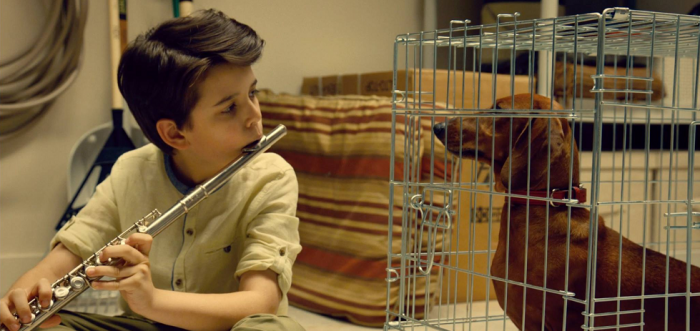
The on-screen toils of our furry, tongue-wagging companions—and of animals in general—elicit the strangest, most indiscreet audience responses. Involuntary gasps, sobbing, and pleas for pain and suffering to be promptly put to an end accompany even the lightest animal cruelty on screen, even in films that feature far greater violence waged on humans. Todd Solondz, famed misanthrope and one of the most eccentric American independent filmmakers, is clearly clued into this perplexing incongruity. His latest film, Wiener-Dog, cycles a helpless pup through five different owners like a modern-day Au hasard balthazar; a four-part anthology of human pain and suffering that plunges into the murky waters of moral poverty and despair with aplomb. The dog does not, as you may have predicted, come out unscathed—it’s often an outlet for the expulsion of misery or a victim of folly. Solondz is characteristically unrelenting. The dog’s suffering, cognisance of its own reality aside, isn’t expressed in fawning close-ups of its big, jet-black eyes, nor through agency equal to its human counterparts, a parade of square pegs and despondents. Like the eponymous donkey of Bresson’s austere masterpiece, Wiener-Dog (later called Doodie, later simply Cancer) bears witness to the lower depths of human anguish, depravity and sadism. If you’re prone to uncontrollable outbursts of empathy towards man’s best friend, Todd Solondz is here to exploit you. And he’s going to enjoy it.
It might not sound so, but Wiener-Dog is a comedy, one of morbid social critique and constant dismantling. An entertaining but otherwise frivolous intermission aside, the film is, unlike its plump little namesake, a no-fat affair. Not since 2001’s Storytelling has Solondz so savagely laid into the American ideal, not only pointing to its corpulent fallacy, but also to the screeching disappointment suffered by the ordinary and benign. Solondz takes apart the very concept of happiness until it no longer seems like an achievable pursuit, and although the four discrete stories bear little relation to one another beyond the appearance of the dog, they do share a unique and specific loss of hope, traced from childhood to old age with remarkable acuity.
The first story, about a nine-year-old cancer survivor (Keaton Nigel Cooke) with stunningly neglectful parents (Tracey Letts and Julie Delpy), is trademark Solondz: almost completely unsurprising, but effective as a slow wade into the stultifying pool of nastiness that he enjoins us to swim in. “She doesn’t think. She’s just a dog”, says Delpy’s Dina to Remi, who looks up at her, his glistening eyes brimming with innocence, begging not to have the dog spayed. Dina counters with fear—she tells him a story about her own childhood dog, named Croissant, who was raped by a feral named Muhammad and came off with a terminal venereal disease, her puppies stillborn. Muhammad, we’re told, went on “raping and raping and raping”. A Solondz trademark: a child learning of the world’s brutal amorality with unfiltered words, in this case through an astonishingly racist lie about an imaginary threat to what the child holds dearest. Politics in microcosm.
Unlike the youngest son of Storytelling’s best segment, who absorbs his parent’s bourgeoisie disdain for their El Salvadoran immigrant maid, Remi sort of flinches and passively contracts at his mother’s nastiness. And unlike Dawn Wiener, the heroine of Solondz’s breakout feature Welcome to the Dollhouse, he doesn’t rebel against it either. Twenty-one years since Dawn’s arrival on American screens, the human doormat bar none appears in Wiener-Dog, transmigrated into Greta Gerwig’s form. Working as a veterinary nurse, she steals away with the titular doggie and, after a chance encounter with old school adversary Brandon (the punky brat in Welcome to the Dollhouse who threatens to rape her, now played by a witheringly deadpan Kieran Culkin) embarks on a road trip through middle America, visiting Brandon’s Down’s Syndrome-affected brother and his wife along the way. While this is clearly the most gentle and least barbed of Solondz’s stories, its impact comes via its reference point. Those familiar with Welcome to the Dollhouse perhaps envisaged a life of staunch individualism from this icon of social outcasts, and yet in Wiener-Dog, although endearing, she is almost pathetically passive, dull, and, worst of all, sad.

Wiener-Dog is, for the most part, filmed by veteran cinematographer Ed Lachmann with glossy austerity. While the near-ubiquitously quiet and heavily colour-graded static shots amplify the mood of hopelessness, Solondz allows for the occasional flourish that, rather than add needless quirk, brings a deeper sense of sadness overall. Whether it’s a long tracking shot of a steaming dog-diarrhea trail soundtracked by Debussy’s ‘Clair de Lune’, or a surreal, gut-wrenching hallucination suffered by the lonely old widow of the final story (Ellen Burstyn)—in which her multiple past selves visit her as a reminder of her failures and missed opportunities—these expressionistic touches, rather than dreamlike whimsy, hit deeper disappointments and realities. They’re also irony-rich: what might seem superficially sprightly leads not to levity but to a reminder that each of Solondz’s stories concerns a deeply unsympathetic person who, despite some measure of physical plenitude, finds him or herself in a position of almost total social isolation.
This is nowhere more evident than in the third and best story, which concerns a jaded screenwriting professor who fraternises with the audibly tan. He’s taking calls from Hollywood producers about a new script he’s written, but finds it being enthusiastically shuttled around studios instead of actually read. He proffers an inane screenwriting philosophy to his students—“What if? Then what?”—who find it anathema to their sophomorically radical bent. Dave Schmerz (Danny DeVito) is perhaps a not-so-covert vehicle for Solondz to share his own experience as a professor at NYU, and seeing his unfavourable depiction of painfully entitled, superhero-worshipping budding filmmakers—one of whom can’t even name a film he likes (“There are just so many. You name it. All different kinds!”)—one can only hope, perhaps naively, that none of his pupils went to see the film. Schmerz is given the film’s great, cathartic monologue, one that ends in a mumbled and tired credo for Hollywood underachievers: “Everyone loves a little schtick.” Solondz has been lucky—in part thanks to indie super-producers Christine Vachon and Megan Ellison, who have encouraged his bleak, unique sensibility—but that luck hasn’t blunted his edges. Here he offers a sawtoothed critique of an industry that both rewards and punishes mediocrity, with a punchline too good to give away, and Schmerz is its sum: ashamed, uninspired, oppressively disappointed.
I’m resisting against my every will to use the phrase “take no prisoners”, which would be apt to describe Solondz’s mode of social critique here (non-discriminatory, piled on thick) were it not for the fact that both the opening and closing scenes show the dog quite literally behind bars. From the gloomily lit dog shelter of the opening scene, captured in another lurid tracking shot, to the figurative prison that is the ceaseless procession of lone-wolf misanthropes that own him—imprisonment is, it seems, a dog’s lot. The poetic injustice of the brutally macabre coda is a nail in a coffin already nailed tightly shut. It’s also wickedly funny.
Even still, what does all this depravity and loneliness, carefully presented but not always sophisticated, equate to? The steely misanthropy, the almost total lack of goodwill towards human beings and animals alike, the jadedness, not to mention the non-causational storyline, the lack of discernable protagonist, the intense, debilitating irony that curses the film’s few well-intentioned characters? These aren’t the ingredients of a regular movie, but they’re catnip to Solondz, who, from the rubble of this narratively disconnected paean to the degradation of American society, consolidates a long-germinating worldview. This isn’t a change of tack, it’s a fortification. With Wiener-Dog he confirms that despite playing some of the same old tricks, this dog hasn’t quite had its day. Solondz’s brand is inexhaustible. People come and go, but there will always be suffering. Or, to put it another way: Life’s a bitch.
Around the Staff
| Jessica Ellicott |
